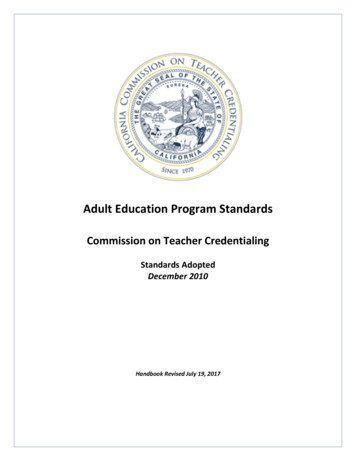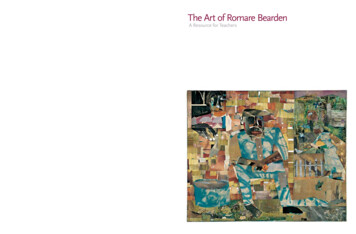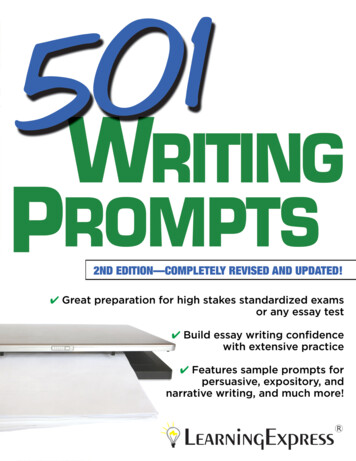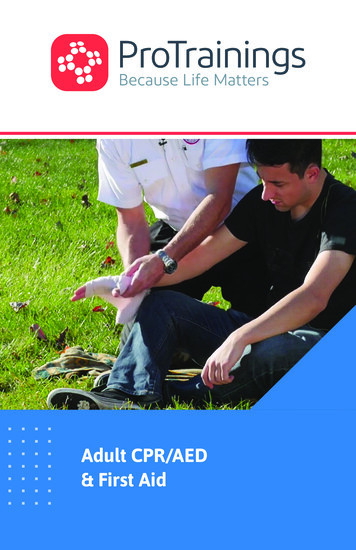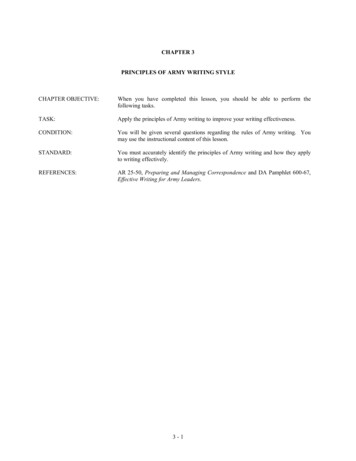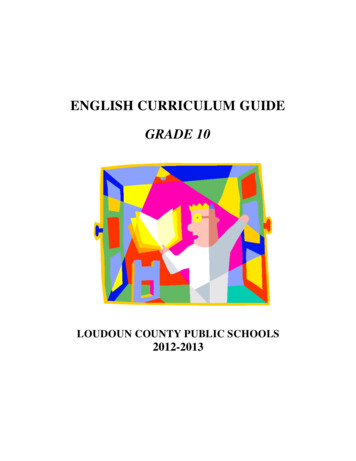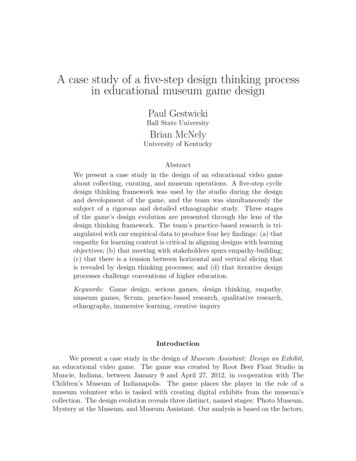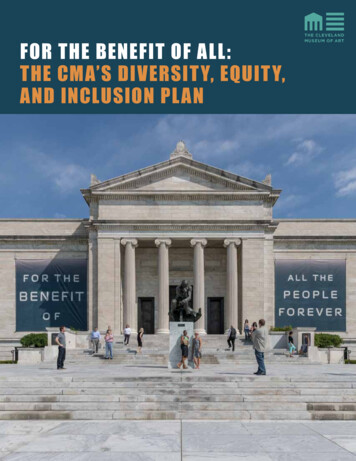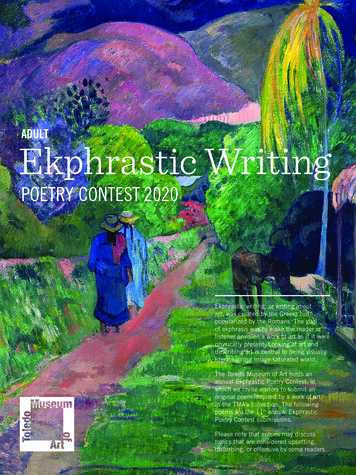
Transcription
ADULTEkphrastic WritingPOETRY CONTEST 2020Ekphrastic writing, or writing aboutart, was created by the Greeks butpopularized by the Romans. The goalof ekphrasis was to make the reader orlistener envision a work of art as if it werephysically present. Looking at art anddescribing art is central to being visuallyliterate in our image-saturated world.The Toledo Museum of Art hosts anannual Ekphrastic Poetry Contest, inwhich we invite visitors to submit anoriginal poem inspired by a work of artin the TMA’s collection. The followingpoems are the 11th annual EkphrasticPoetry Contest submissions.Please note that entries may discusstopics that are considered upsetting,disturbing, or offensive by some readers.
Charity AndersonOur Last MarchHow do I forage the nature of our demise:Do bees beckon the fruit to become on boughsOr do they simply gather what they canBefore coldness sets inAnd bestow faultless masterpiecesAs postscripts to their beloved blossomsArthur HughesOphelia (“And He Will Not Come Back Again”), about 1865Oil on canvasPurchased with funds from the Libbey Endowment, Gift of Edward Drummond Libbey, 1952.871
Amy BallardFIND MEVacant rooms on vacant floorsdeserted windows, darkened doorscourtyard in shadow all times of dayshell of a hermit crab moved awayThis will be me when he is goneuntil I can turn the power onand find some furnishings of my ownlike the ones he said I’d outgrownFind some tapestries, sculpture,glass open the window, let the breeze passplant geraniums, paint the doorYou’ll find me sunny, myself once moreVilhelm HammershøiInterior of Courtyard, 1899Oil on canvasGift of The Georgia Welles Apollo Society, 2000.302
Janice BethanyOn a Gray ScaleInside the museum is a portraitof a man. You notice his tailored coat,vest, neck cloth elaborately looped,his look of mild restlessness caused perhapsby sitting so still with life calling beyondthe backdrop. The manuscript prop isa sign of his literacy, and the mansurely apprenticed and achieved, earningthe means for this portrait, a mark of status.You study his reserved, reflective gaze,finding quiet visions in his smile.He appears to be a fair man; if hewere a barrister, his searching eyes sayhe would weigh both sides of your premise.His lean physique implies temperance.The slight erosion of hairline speaksto past and coming years. Painting the man’sthick hair, the artist may have brought outresistant strokes in both their naturesbut not at either’s expense. This man wassomebody. A choice was made toportray him modestly, in black and whiteoil on panel, leaving you with the man’sunderstated place on a gray scale.Samuel Lovett WaldoPortrait of a Man, about 1829-1830Oil on panelPurchased with funds from the Florence Scott Libbey Bequest in Memory of her Father, Maurice A. Scott, 1954.313
Adele DahlinGossip HellO two-faced gossip,wear the spiraling helmet and your dual punishment,tattooed like ringworm boringinto your surprised skins.With one face you must hear like a man,with the other, listen like a woman,weeping forever at what he said, she said.Labyrinthine language tightensin whining coils, one torturing each ear.Soft whispers carry sharp messages,martial throwing stars that carveyour conscious, your conscience.Listen painfully and you must eternally,your neck cords straining at attention;lips part, nostrils flare, eyes round:What have you heard? What do you hear?Fiery news singes your brain,steams from every orifice andarmless, you can never loosen this hell-helmet.Its leather leash braided into your elaborate necklacebinds you to the iron blockwhere you relentlessly, endlesslylisten,listen.Ejagham people, Ekoi subgroupCrest Helmet, early 20th centuryWood, antelope (duiker) skin, palm fiber, bamboo, metal studs, kaolin, and pigmentPurchased with funds given by Dorothy Mackenzie Price, 2005.3214
Kelly EckelDistinguishable RevulsionWho controls the eyes I see in the mirror?It is me, I blur your vision to withhold the truthWhat is the purpose of your torture?To purge your dreams with unrealistic expectationsHow do you keep my loathing so fierce?I tell you that you are nothingWhy would you wish me harm?Because I am youPablo PicassoWoman with a Crow, 1904Charcoal, watercolor, and gouache on paper, mounted on pressboardPurchased with funds from the Libbey Endowment, Gift of Edward Drummond Libbey, 1936.45
Sharon Fish MooneyThe Shepherd’s StarCapella rises, dusk replaces day;the shepherd’s star now guides the goats that roam.It’s a sign that pierces clouds and lights the wayof a weary peasant woman bound for home.Barefoot, she treads the dusty well-worn path.Around her waist a silver sickle’s tiedto cut down brambles, briers and long grassthat grows prolific in the countryside.She’s gathered new potatoes in the field;they fill a hessian bag she’s holding high,while in the distance Angelus bells peal,reminder of a son who came to die.At home she’ll rest; her day of work is done.She’ll rise again, at dawn, to greet the sun.Jules BretonThe Shepherd’s Star, 1887Oil on canvasGift of Arthur J. Secor, 1922.416
Sarah FisherUnreachableAleksandra (Sasha) StoyanovSilence, 2006Wool, sisal, silk, cotton threadsPurchased with funds given by Georgia Welles Apollo Society members Joseph V. and Judith M.Conda, Bill and Pam Davis, Louise and Greg Gregory, Ann W. Hartmann, Eileen Kennedy andRobert Heim, Jeffery and Inge Klopping, and Mrs. Philip G. Simonds, with additional support fromthe Libbey Endowment, Gift of Edward Drummond Libbey, 2019.62Each square a shadow of someone who attended this table,The visage of a soul no longer present,Each section its own story woven into a room now unattended.Huge and dark at first, yet so bright within its intricate depths.Nothing left to feed us but expectation.I desperately want to tear it from the wall, to breathe the smell of distant fabric into my lungs,To feed the texture to my brain with my fingertips, holding the seams and memorizing them.I walk away with clenched fists, fighting my own breath.The feast gone, deliciousness devoured,An empty table left alone stabs at my soul over and over again.I return for more, repeatedly standing in its beautiful emptiness.I am bound with the questions of a vastness unanswered, clinging only to the hope ofsomething later,A calm white cloth screaming out its need for more.My heart is on this wall.7
Walter GlasshouseThe Door to InfinityInfinite, serene, the endless expanse suggests divinity incarnateIn a glance, perception morphs with every subtle change in iris angleLights that radiate inside like the songs of vibrant angelsSolace to her mind, polka dots in time. Quell the anxious mutterings with details pointed fineThank you for the stillness. The mirrored silhouettes rebuild usThank you for the fire that flies softly from your soulThank you for the water that you’ve offered down belowUnafraid to see forever, you travel outside boundaries of dimensionYou peer into our consciousness, revealing all intentionYayoi KusamaFireflies on the Water, 2002Mirrors, plexiglass, lights, and waterWhitney Museum of American Art, New York; purchase with funds from the Postwar Committee and the Contemporary Paintingand Sculpture Committee and partial gift of Betsy Wittenborn Miller 2003.322. Photograph by Sheldan C. Collins8
Eric HehlHave I?You came here to find rest. And now so have I.This grass, yellowed, in the late season,is withered.Once, it stained the feet of my childhood,green with life, running in a spring breeze,reveling in a summer to come.We found our color here, a dazzling balletof wildflowers and contentment.All too quicklyI let that verdant dance wash over mewhile I chased death, and took you with me.I desired more, and so many long hoursI offered to the Insatiableso I could give us what you already had.All the while like these treesoffering their shade in the autumn sunyou waited.I did not know more could become lessuntil the cold breeze of winter’s graspripped you away.Now these leafless trees that once sang are silent.After a season, you found what you wanted.After too many, so have I.George TookerMeadow I, 2005Egg tempera on gesso panelGift of the Woodward Foundation and purchased with funds from the Libbey Endowment, Gift of Edward Drummond Libbey, by exchange, 2007.479
Melissa HeltonPandemicGirl. I feel ya. Hands and feet half way toward movement, to hoppingoff that perch, but stalled. It’s a pandemic and we’re still inthe graph’s upswell. The galleries are empty, the libraries and restaurants.Graduations and weddings canceled. I know you’re worriedabout your sick sister and your old, old mom, the kids at home turningferal, the scary, scary news. I see your big head filled with allthose thoughts, your eyes cast toward the floor under the weight,your body 100% inertia. I understand, darling. Let’s share thismoment on the livestream because it’s all we can do. Because love,right now, is an empty building. Love, right now, means staying away.Kiki SmithSeated Nude, 2005Bronze with silver nitrate patina on painted wood basePurchased with funds from the Florence Scott Libbey Bequest in Memory of her Father, Maurice A. Scott, 2018.1810
Lydia HorvathWoman: VahineHow I came to befaceless, a counterbalanceand how I was includedby that manin the same way asa beast of burden, a treeimportant only asacquisition, composition –my real meaningforgotten, left out,or worse –twisted intosomething alienHow it was that Isat for him,talked for him, evenAllowed him –So exotic to each otherit seemed enough, at first –but withdecision, volitionall out of balance –only him with a face,choosing the time,the placeHow the day drew onwith warning, an omena sign of thunder butno rumbleshowing the spirits’ imbalancemy sisters seeing, butpassing us byBetter to leave it beand forget,I heard them thinking,heads bowed,mouths silent,knowing what was comingPaul GauguinStreet in Tahiti, 1891Oil on canvasPurchased with funds from the Libbey Endowment, Gift of Edward Drummond Libbey, 1939.8211
Jacob KempfAnd I Approach the WeaponI don’t knowwhat it wasthat woke me that grey dawn.Did I even hear something,or was it my imagination:The porter? Slack? Steel wheels on steel rails?Footsteps quickening in the hallwaythrust me to my roomette door,a figure emerges from the darkness,stocky and cumbersome, it moves toward me.I duck out of sight as the hunchback passes.Seconds to minutes and I’m in the empty hall,a glint lowers my gaze downwardand I approach the weaponas a beast stalking its prey.A quick sweep and the machine is gone,snatched under my skin for a short time.I disappear again into the roomette,my free hand opens the latch, humidity entering.Soon, I feel much lighter, freer, calmer.The humidity is gone and I’m at ease againnot even thinking twice as the quickening wheelslull me back into my sleep.Richard Bosman11:05 to Chicago, 1983Oil on canvasGift of Dr. and Mrs. John T. Chiles, 1989.11612
Matt KizaurWhat They Say In AberdeenAn Elegy for Janet Crane BarleyOnly kindred souls truly knew the misty-mystery blue of you.Braemar’s breathing shuddered upon your leaving, our full hearts cleavingTrees and mountains upon sky, the closing of your eyes, lost among the waters of whyA tapestry wrended, our circle-thoughts ended, the tatters of matters pretended:Will-o’-the-Wisps’ soft-kiss whispers and scriptures of missing her.What they say in Aberdeen, about this once-girl who came to gleanStories of Finn, the one and only, and ale offerings to the SeonaidhBespoke herbridean promises and honor-bound Culloden marchesShe wove threaded words for clan and kin, winding ways there and back againBlessing Sir John’s Aigas Hides, rolling tales of lochs and downs and tidesThe Framer’s cloud-piercing light, and sacred-lantern incants’ nightThe sleepy heads of sullen maids, spitting kelpie curses on their graves.She kept them all in painted prose, pleating stories each Highlander knows.Hold fast the lonely hunter and fairy-glow Cú, the magic salmon in spring-river newAnd walk among the clouded moors, through heather fields and oaken doorsTo feel sprite-moments of her loving heart, banishing achy doubt as each depart.Gustave DoréThe Scottish Highlands, 1875Oil on canvasGift of Arthur J. Secor, 1922.10813
Lisa KokoskiRock SolidWater and earthPotash feldspar, quartz, plagioclase, biotite, and hornblendePoints, lines, angles, surfacesEuclid and BurtonPerimeter 2 (a b)Area Base x HeightHe rolls his red walker off road and makes a beeline to one of the legless chairs,Connects some black flecks with his index finger, locks the hand brakes, and lands hard on thepolished seat.The stacked parallelograms are joined at the hip.I sit sideways on the mate, lean into the angled back, and fold my left arm on the warm shelfbeside me.He won’t hear me unless I aim for his right ear.“Boy, this is living,” he says as he pulls a few Hershey’s miniatures from his pressed shirtpocket.We divide them even-steven and share the water I carried in my pack.He looks at the tree and we try to guess its age. We wonder how far its roots stretch.He marvels at the aimless grain of our granite chairs. I have seen it before in a state capitol.We can’t decide if the chairs were permanently placed by man, men, or crane.He tells me again how much he loves rocksAnd then scans the sky for birds.I hear him softly sing Amazing Grace, but it isHow Great Thou Art that comes to mind.Scott BurtonPair of Parallelogram Chairs, 1987Polished Balmoral graniteGift of Georgia and David K. Welles, 2003.50A-B14
Jacinta KrecekSonnet: To the SwallowsWithin our campus, spring’s sure sign arrivesAppointed day when feathered friends returnO’er causeway gracing skies with swooping divesAt last appears glad sight for which I yearn.Admire their fork-tailed royal coats of blueTake note: an open beak’s sweet chitt’ring waysArise high soaring, drop and glide on cueAnd water-skim ‘mid sun’s bright glitt’ring rays.But those who trod on by all miss the showWith lowered heads hunched over screens they stareWhile circled flights crisscross above and lowAir acrobats performing feats so rare.If I but stop and watch a moment herePerhaps you too may share this joy so dear.Nankoku OsawaBevy of Flying Birds, Restoration Period (1868-1912)WatercolorGift of Edward Drummond Libbey, 1912.62815
Leonard KressFrank O’Hara Undisplayed(in the Closet)I visit my favorite museumwanting to pay a visitto Frank O’Hara.It’s been a while since I’ve seen him-half-reclining on the couchwith the Bonnard slipcover he never picked outhis elbow slumped into a cushionright arm draped across abdomen,bare legs spread and toes curled.He’s so comfortable, there’s plenty of roomI’m sure he’ll invite me inoffer me a soft drink, drop the newBud Powell on the turntable(his friend Fairfield Porterout back cleaning his brushes)He knows I’ll stay silent and listenas he laments Lana Turner’s collapseand Billie Holiday’s demise.I promise not to overstay my welcometo keep my outright sadnessover his impending deathand his absence from these gallery wallsto myself.Frank O’HaraFairfield Porter, 1957Oil on canvasPurchased with funds from the Libbey Endowment, Gift of Edward Drummond Libbey, 1977.3116
Timothy LanghorstSilence1Enter in to it.A serene, intimate solitude.Light creating suggestions of permanence.Like atmospheric music, a melisma of dust motes,Notes, subdued piano, electronic drone, violin,drifting, scattered, forming.It envelopes youRevealing a placeThat remembers and forgets.Transitory lightlike wool of the Avassi sheep, spun yarn, dyed in natural shades,Hushed, monochromatic hues,A resonant rainbow of grey, brown, black on patterned, textured wall.A simple table,Offset, bearing no weight,Rests on an inarticulate horizon between floor and wall;an unadorned white cloth, purposefully draped over the tablewaiting for the magician to snatch the material awayrevealing a secret.This modest spacelike the possibilities of an open-ended questionspeaks and sings, soundlessly musical.Threads of life and death, chaos and certainty.Connecting and disconnected.Nodédet beyn ór uveyn ófel2.Moving between light and darkness.Aleksandra (Sasha) StoyanovSilence, 2006Wool, sisal, silk, cotton threadsPurchased with funds given by Georgia Welles Apollo Society members Joseph V. and Judith M.Conda, Bill and Pam Davis, Louise and Greg Gregory, Ann W. Hartmann, Eileen Kennedy andRobert Heim, Jeffery and Inge Klopping, and Mrs. Philip G. Simonds, with additional support fromthe Libbey Endowment, Gift of Edward Drummond Libbey, 2019.621Recommend that this be read while listening to Into Silence I by Jane AntoniaCornish, from the album, Into Silence2Nodédet beyn ór uveyn ófel (Moving between light and darkness) from FiveHebrew Love Songs, by Eric Whitacre, lyrics by Hila Plitmann.17
David LymanstallPraise LightI rise each dayBefore dawn,When the blackness of nightEnvelopes theDetermined light of morning,To witnessThe transition, the birthingOf a new day.To seeThe magic of lightRefract fromThe feather of a bird,Restoring the gloryTo pigments of every shade,As they appear to say, “good day”To the fading night.Melchior d’HondecoeterPoultry in a Landscape, 1600sOil on canvasPurchased with funds from the Libbey Endowment, Gift of Edward Drummond Libbey, 1949.10218
Amanda McGuireModern MarquetryAbove the single wall oven, a fresh jar of pickled cukes.And out the picture window, a sunset so red it’s atomic.Where plywood and insulation have fallen so has a tree,its limbs a clothesline: a yellow tee with baby doll sleeves,green trim, and a bow at the center of its collar. There arehints of beauty here—framed indigenous art, unblemished,wheat shellac on the vintage toaster—among this disaster.Slow down, my love. Look carefully. What was once the fridgenow a bird cage, chicken wire and padlocks. By the sink,a tube for rainwater, harvested in a clear plastic dispenser.String and twig hardware on the cabinet, closed. In the open,glass jars with naked labels, a metal tin that once held cookies.Have you noticed, dearest? It’s us, living this, in our own home,and we are barely surviving, even though the linoleum is in tact.Alison Elizabeth TaylorKitchen, 2014Wood veneer, oil, acrylic and shellacPurchased with funds given in memory of Larry Thompson by his children and grandchildren, 2014.2219
Gary MomeneeSo Much Color andWell-Being in the AirWho needs a sky with a roof so blue?Strokes of wind bruise the upper airAnd whip the greenery into spiral wavesBut can’t perturb the white façade.The house sprawls with a natural easeAnd huddles close by its neighbors.It gathers the countryside around its doorAnd the land returns a hard embrace.The rambling stone wall beside the roadSeems sprung complete from the sloping ground.Behind it a garden is tossed in bloomAnd in front, red poppies clamor in the grass.A fitting habitation, thinks the summer guest,As perfect in its purpose as a robin’s nest.Vincent van GoghHouses at Auvers, 1890Oil on canvasPurchased with funds from the Libbey Endowment, Gift of Edward Drummond Libbey, 1935.520
James J. MomeneeThe ReaperThe reaper toils at harvesting souls in the spirit of Millet,Beneath the “Good God Sun” on an Auvers’ summer’s dayVibrant yellow sheaves of wheat flood the fields with golden light,Tassels of grain swirl and sway from the mistral’s menacing mightA cumulus cloud floats slowly over the frenzy down below,Casting it’s shadow provides fleeting relief from July’s fiery glowWielding his sickle he slashes the stalks at a constant steady pace,Wearing his wide brim straw hat that shades his weathered faceGhostly bound stacks of wheat line up to receive the eternal promise,God’s grace is bestowed upon the disciple for a blessed and bountiful harvestVincent van GoghWheat Fields with Reaper, Auvers, 1890Oil on canvasPurchased with funds from the Libbey Endowment, Gift of Edward Drummond Libbey, 1935.421
Lylanne MusselmanWinged Impressionsto Laurits Andersen Ring’s Rooks in a FieldAs soon as my eyes land on the painting, Rooks in a Field, I recall that small packet of cards inmy grandma’s upstairs drawer, Rook. A game I never got to play as an only child. Yet, I lovedthat picture: A Rook’s silhouette on the deck. I marvel at how much Rooks look like crows.Crows always fascinate me, they’re no “bird brains,” they make their own tools, they take oncomplicated tasks, they recognize human faces, they play pranks. It is odd a group of them arecalled a murder. Perhaps that’s where Hitchcock got his idea for using them in his thriller, TheBirds. A movie that instilled fear of these creatures for years in so many. I admit these birdslook ominous when flying in a flock overhead or looking to land – perhaps searching for food, arespite from a long flight. Or are these birds I’m looking at carrying an omen – that thesecoughs in the gallery are the precursor for a coming pandemic, where unlucky humans staystationary and solitary, while Rooks (and crows) in fields still flock and are free to come and go.Laurits Andersen RingRooks in a Field, 1891Oil on canvasPurchased with funds from the Florence Scott Libbey Bequest in Memory of her Father,Maurice A. Scott and with funds given in memory of Sarnoff A. Mednick, 2016.1322
Sarah RayThe American’s DreamColumns sprout like treesfrom the earth. Gold leafcapitals adorn the skyline.The muses arrive on the breezeshaping and sculpting this motifof high society shine.From my balcony I seea fantasia to false gods,built on slave labor suffering.We are not free!The man on the pedestal nods,and demands our offering.One day the river will rise!The marble will erode!That is all to which I aspire,here in a nation built on lies.Horrors of his generation, to us bestowed!Nevertheless, burning bright, there is a fire.Thomas ColeThe Architect’s Dream, 1840Oil on canvasPurchased with funds from the Florence Scott Libbey Bequestin Memory of her Father, Maurice A. Scott, 1949.16223
Kelly RoseOn “Two on the Aisle”The dinner hadn’t gone as planned, but now they were hereShe had put on the dress, beads and lace, an intricate showAnd now, the fearA pearl earring lost, rolling beneath the velvet rowOf seats, empty now, as he stood waiting, unable to see or hearShe was ready to leave, but could not goAnd now the lights were down, heavy curtains, slowly skimming the floorThe beginning of the showShe breathed in and smelled the fog of make-believe, burgundy lips, wanting moreEdward HopperTwo on the Aisle, 1921Oil on canvasPurchased with funds from the Libbey Endowment, Gift of Edward Drummond Libbey, 1935.4924
Kelly RothgebGlory of the Cherry BlossomLook up at the stream of lights and blastsHow they glisten and mock the cries of the innocentChildren screaming and begging for mercyFire immerses their dreams forgottenWashington gloats in their gloryAnother win they sayThey do not feel the despair and lossThe millions of dollars falling from the cherry blossoms blur their visionHarold EdgertonAtomic Bomb Explosion before 1952, before 1952Gelatin-silver printGift of the Harold and Esther Edgerton Family Foundation, 1996.3825
Kathryn SadakierskiPoetry of the SoulLight in lace patterns,Creating shadow chiaroscuros among the trees,Like how the sun shines through stained glass,Casting mosaics onto the forest floorIn kaleidoscopic shapes,Stars fallen to Earth,Prismatic meteors.Taller than Gothic towers,The trees instill quiet and peace,Breathing life into your spiritAmid the stillness of the woods,Your feet upon the dirt,Entwined with your roots,Telling you your truthLike sermons in a cathedral would do.Robert HenriCathedral Woods, Monhegan Island, 1911Oil on canvasFrederick B. and Kate L. Shoemaker Fund, 1919.4726
Gina SaresThis Is Our ReclamationMy mother sinks bulbs into soiland their sprouting is her first full breath.Her lungs expand with the garden’s risingand by summer the sky is hers to inhale.She brings me fragrant clippings.This is heritage:The extension of self through creationand the sharing of it, as if to say,I am worthy of space.And so are you.So I take up the pen.The words form like birds at bath,lifting and swooping, warbling joyand heartbreak. There is beauty evenin their making—the turn of my wrist, the pauseof my hand, the rhythm of rooting thumbprintonto paper. This writing is a charting.I, too, have walked.I, too, have story.This is how I become, like so many women,the rain clearing its throat after drought.Each stroke a drop reclaiming land.I open in splashes, silver armsraised in victory.Chunghi ChooVase, 1986Electroformed copper, silver plateGift of The Georgia Welles Apollo Society, 1996.1027
Michael SchulzIt’s Time To Move OnWe perch inside the limbs and freezewith fear. We see The Hunter, watch the peeling bark,the falling leaves. Beyond the hills, the cattle eat the skinfrom fallen trees. The grass has turned to dust.The tanbark used to line the floors of circus tents,the pieces broken up on racetracks, crushedbeneath the hooves. We want to fly away and find a pond,where tannins leach and turn the water brown like tea.We want to drink the wine inside the cooper’s barrel,after years of shaping hundred year old trees.We never knew a buttonwood is just a sycamore,or that it’s used to make the smokeless coal that burnsinside The Hunter ’s stove. We feel the cold.The wind is pushing us to chase the sun.We want to leave, but know, with just a look,to wait until the shots are fired, before we burst into the sky.Andrew Newell WyethThe Hunter, 1943Tempera on masoniteElizabeth C. Mau Bequest Fund, 1946.2528
Judi SeldenCaged BirdJust look at you,feathered, coiffed, corseted, chokered, muffed,shod - no peek of delicate ankle bone,a caged pretty bird! Contained!Will you lift your heavy skirts above your ankle to flee from your perchstepby stepby stepinto the square where sculptures of men and might reign?Your eyes hint maybe.Yet, you may not walk about London alone!You’ve no means to support!You must temper your intelligence!Your place is in the home!You’ve no right to vote!Rigid mores forbid your flight!Before sleep, your body deliciously freed from its pretty-bird couture,luxuriates,as you loosen your pinned chestnut hair.Running your bared hands through it,you contain your hair in a braid.Slipping into your nightdress, you cover your body once more.In darkness, when his wiry, ruddy beard rasps your softness,the cage door - open for only a whisper - closes.James TissotLondon Visitors, about 1874Oil on canvasPurchased with funds from the Libbey Endowment, Gift of Edward Drummond Libbey, 1951.40929
Susan SpencerInstagram ManHey youYes you, you Instagram manI see the way you look at meThrough beady eyes and voluptuous chinStop looking, pleaseYou say I am yellow and short, my eyes stay open in the middle of the nightI am not, so I pull the skin off my fingers, just the rough partsI pray you stop, pleaseAnd now I eat too much, and too littleI go get bulb cancer, I rock back and forth on the busHow about now, Instagram man?Still rockingYou look funny, we laugh, eyes leakingBut there is no weAnd there is no youYou are meGiorgio de ChiricoSelf-Portrait, about 1922Oil on canvasPurchased with funds from the Libbey Endowment, Gift of Edward Drummond Libbey, 1930.20430
George StamosMelancholy SerenadeAnother nightOf classical musicBefore me,To bore me.The struggle forEyes to stay open.My chin bouncing,Snapping back,The precise jabOf the Steinway keyboardMaking my headA speed bag.And she,Of the private box,Takes no notice of me.Her coat is being checkedBy a man in tailsAnd perhaps,After the performance,He will drink champagneFrom her slipper,While I takeMy toast and teaIn the study,And let Proust put meIn the catbird seat.Edward HopperTwo on the Aisle, 1921Oil on canvasPurchased with funds from the Libbey Endowment, Gift of Edward Drummond Libbey, 1935.4931
Kerry TrautmanWithholdingRothko’s planes of layered pigments barely presstoward each other like teenaged thighs—inadvertentlybut controlled, aligning in football bleachers.Like china cabinet wine glasses hovering,not clinking together at footsteps.My son taps his phone. My onions simmer on the stovetop.I don’t ask if he’s ever kissed a girl or boy.I can’t remember for him the first time he gaspedand screamed in sterile hospital air.I can’t press his chest against another to ignite sparks.Some pigments were never intended to blend, orwould bleed so fully they would transform.He thinks he knows the risk in transformation.It’s as if Rothko knew I could never say everything,knew that my son would never boil over, that Ican’t remember for him the moment he decided to lean away,and I can’t instead unsteady his balance into me.Sometimes two beings are bridged only by air carryingthe scent of browning butter. Some bodies coexist,appreciating, simmering from safe distance, like a dare.Mark RothkoUntitled, 1960Mixed media on canvasPurchased with funds from the Libbey Endowment, Gift of Edward Drummond Libbey, 1970.5532
Sam Wright17Dedicated to the 17 victims of the Marjory Stoneman Douglas H Sshootings in Parkwood, FL on Valentine’s Day, 2018.Though they are not, they might be Huck and Tom, Becky and Emmaline, gallants andgals in a simpler time. The wild woodlands, the verdure of white pines, the golden rustof birches, fuse, blend in ripples upon the shallow face of a slow, welcoming brook.How lazy the day, how innocent the guidance, the helping hands.The boulders and the treefalls have shoulders rounded by time,are too sage to suggest anything but peaceful whispers or a refreshing nap.One boy, shoeless in the water, holds steady, his feet planted in the painting’sbackground; while his friends balance atop a fallen log, bridging the watersand the painting’s foreground. Children, can you imagine what lies beyondthe next hill, or the place I view you from?For you, the death and carnage of the Civil War is one decade gone.But other disasters are lurking: soon, someone
The feast gone, deliciousness devoured, An empty table left alone stabs at my soul over and over again. I return for more, repeatedly standing in its beautiful emptiness. I am bound with the questions of a vastness unanswered, clinging only to the hope of something later, A calm white cloth s


